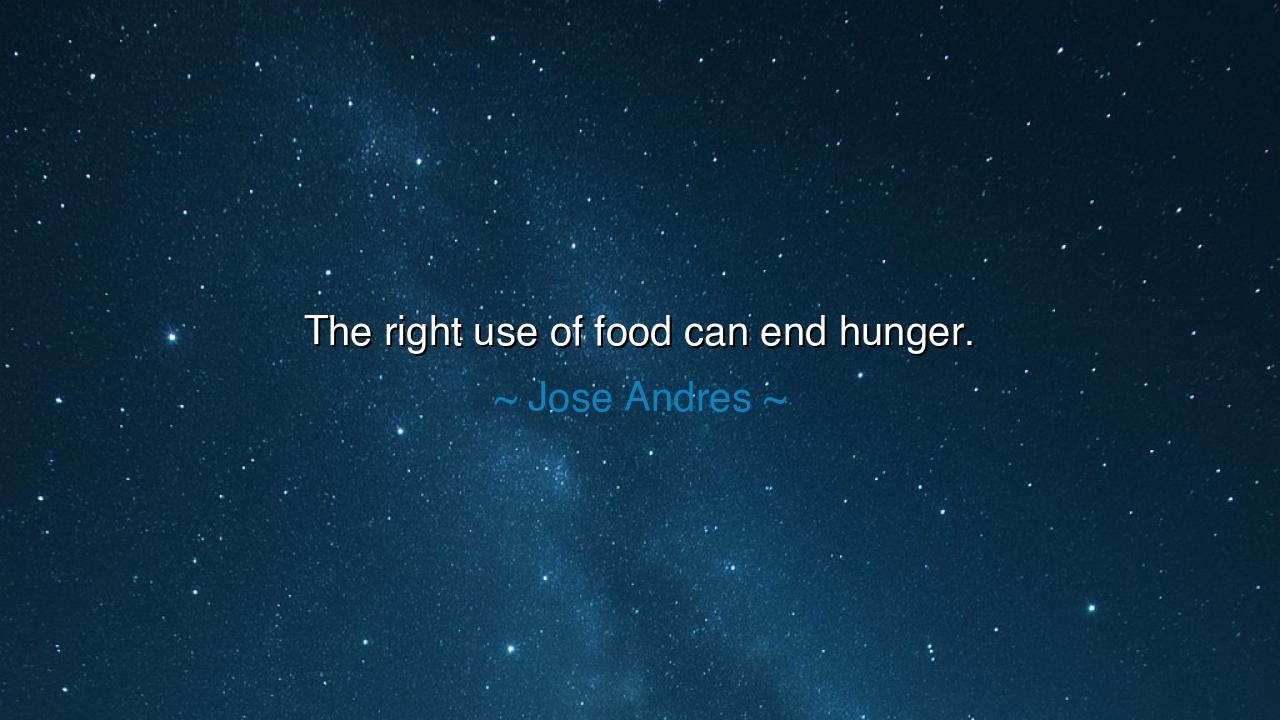
The right use of food can end hunger.






Host: The sun was setting over the harbor, casting the kitchens of the relief camp in gold and smoke. Steam rose from giant pots, mingling with the smell of spices, bread, and rain-soaked earth. The air was thick — not just with heat, but with purpose.
Volunteers moved in a rhythm — ladles, voices, laughter, the sound of plates clattering against hope. In the corner, Jack stood by a burner, stirring a pot of lentils, his shirt stained, his brow damp, his movements mechanical.
Across from him, Jeeny chopped onions with quiet focus, her eyes red, though not entirely from the fumes.
Pinned to the tent’s canvas wall was a quote, written in marker, the letters bold but smudged from humidity:
“The right use of food can end hunger.” — José Andrés
The words seemed to hover, challenging everyone who read them.
Jeeny: “You’ve been silent for an hour, Jack. Either you’re concentrating, or you’re brooding again.”
Jack: “Both.”
Host: He tasted the soup, grimaced, added salt. His movements were sharp, efficient, resentful.
Jack: “I keep thinking about that quote. ‘The right use of food can end hunger.’ Sounds noble, sure. But it’s a fantasy. Hunger isn’t about food, Jeeny — it’s about power.”
Jeeny: “Maybe it’s about both. Power decides who gets the food, but wisdom decides how it’s used.”
Jack: “Tell that to the millions of tons of wheat that rot in storage every year while people starve in the same country. Wisdom isn’t what’s missing, Jeeny — it’s will.”
Host: The sound of a truck approaching rumbled through the camp, followed by voices — a new delivery of rice, beans, hope in sacks. The air shifted; people moved faster.
Jeeny: “José Andrés feeds people in warzones, Jack. He doesn’t wait for governments. He just acts. That’s the ‘right use’ he’s talking about — not policy, but action.”
Jack: “Yeah, and for every chef like him, there are a thousand bureaucrats who’ll argue for weeks over permits while children die. You can’t cook your way out of systemic corruption.”
Jeeny: “You’re right, you can’t. But you can feed one person, then another, and another — and maybe that’s how systems start to crack. You’re too used to thinking in walls, Jack. Try thinking in tables.”
Host: He paused, his spoon hovering mid-air, as if the word “tables” had caught him off guard.
Jack: “Tables?”
Jeeny: “Yes. Tables where people eat, talk, listen. You’d be surprised how many wars have ended over a meal. Food is the one language everyone understands — the one currency that doesn’t divide.”
Jack: “Sounds poetic. But I’ve seen how food is weaponized. Governments control it, armies withhold it, companies exploit it. Food isn’t a bridge, Jeeny — it’s a battleground.”
Jeeny: “Only when greed is the chef.”
Host: The words hung in the steam, heavy, true. A child’s laughter broke through the noise — a small voice, innocent, unaware of the philosophies being debated in the shadows of stoves.
Jeeny: “You know, Jack, I once read that during the Spanish Civil War, when José Andrés was a child, he watched his parents cook for neighbors who had nothing. He said that’s where he learned what food really means — it’s not charity, it’s solidarity.”
Jack: “Solidarity doesn’t fill stomachs.”
Jeeny: “It starts the fire that cooks the meal.”
Host: Jack sighed, leaned against the counter, hands blackened from smoke, his expression split between admiration and doubt.
Jack: “You make it sound so simple, Jeeny. But the truth is, the world doesn’t starve because of a lack of food — it starves because of inequality, waste, and indifference. ‘Right use’ sounds beautiful, but it’s idealism against an industrial machine.”
Jeeny: “And yet, every machine can jam if someone throws a spoon in it. That’s what José does — he interrupts the system by feeding before the system can fail.”
Jack: “You think food can be a revolution?”
Jeeny: “It already is. Every plate served to someone ignored by power is an act of rebellion.”
Host: A volunteer approached, asking for help. Jeeny walked over, kneeling beside a child, handing him a bowl of rice and beans, smiling as the boy devoured it. The moment was small, but it glowed with quiet power.
Jack watched, his eyes narrowed, then softened — not in agreement, but in recognition.
Jack: “You really believe this can change anything?”
Jeeny: “It already has. Look around you. Every person here is full, at least for tonight. That’s not policy — that’s proof.”
Host: The rain began again, soft, forgiving, washing the dirt from the ground outside. The sky darkened, but the camp stayed lit — the fires burning, the pots boiling, the hands working.
Jack: “Maybe you’re right. Maybe the revolution isn’t in protests, or papers, or parliaments. Maybe it’s in kitchens.”
Jeeny: “That’s what I’ve been trying to tell you. You don’t end hunger by feeding people — you end it by changing what food means. By turning it from a commodity into a right.”
Host: A pause, filled only by the sound of rain and breathing. Jack looked down at his hands, coarse, tired, but for the first time, they felt like they were building something, not just serving it.
Jack: “So, the ‘right use’ of food isn’t just about how we cook it…”
Jeeny: “It’s about who we cook for. And why.”
Host: The camera of the moment pulled back — the steam, the smoke, the firelight, the humanity — all blending into one moving portrait of hope.
And there, amid the pots and voices, the quote on the wall no longer felt like a dream.
It felt like a recipe — for a world that might one day learn to feed itself, not just with food, but with conscience.






AAdministratorAdministrator
Welcome, honored guests. Please leave a comment, we will respond soon